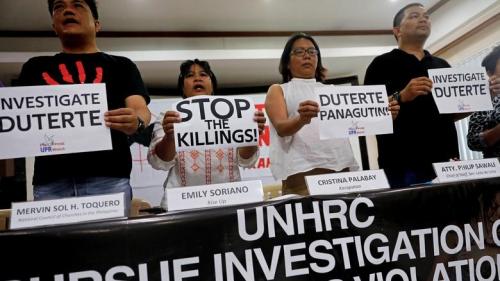
Photo by Eloisa Lopez/Reuters

Photo by Eloisa Lopez/Reuters
With the recent decision of the International Criminal Court’s Pre-Trial Chamber to open an investigation in the Philippines and ahead of the report of UN High Commissioner for Human Rights on the status of implementation of the Human Rights Council’s resolution on technical cooperation and capacity building in the Philippines at the 48th session of the UN HRC, Karapatan scored the “dire inadequacy or lack of effective domestic mechanisms in delivering justice and accountability for human rights violations in the Philippines.”
Karapatan Secretary General Cristina Palabay said that both “the Inter-Agency Task Force on Administrative Order No. 35 and the inter-agency panel on the drug war have yet to show any significant progress in holding the perpetrators of these violations accountable and bringing them to justice.”
From the creation of the task force in 2012 to December 2019, the task force has handled only 385 cases, according to its latest data, including cases that date all the way back to 2001 under the term of Gloria Macapagal-Arroyo.
Only 13 convictions have resulted from the task force’s investigations, according to the Philippine government’s human rights situationer. In 127 or 33% of the cases, the perpetrators were cleared; they were either acquitted, or the cases against them were dismissed by courts. 111 of the cases are archived and 89 are still under investigation. Among the cases the task force is currently investigating include the killings of peace advocate Randall Echanis, Karapatan human rights worker Zara Alvarez, the Tumandok massacre in Panay, and the killings in the Bloody Sunday raids in Southern Tagalog.
As a supposed domestic mechanism to address killings and other human rights violations against activists and journalists, Palabay said that “the task force fails to uphold its mandate when the same violations continue with even more brazenness, especially under this murderous regime which issues clear directives for State forces to kill, kill, and kill. How, then, will the DOJ inspire the confidence of the victims or their families to cooperate with the task force’s investigations if the panel also has the perpetrators of such violations in it? It raises the issue of the task force’s credibility and independence, and therefore, its effectiveness in fulfilling its mandate.”
On August 16, 2021, Secretary Guevarra announced that the panel had reviewed the 52 drug war cases forwarded by the Philippine National Police. As of this writing, no report has been made public by the DOJ. The 52 drug war cases comprise only .9% of the 5,655 deaths cited by Guevarra in his June 2020 statement before the HRC.
“These cases are a mere drop in the bucket of reported drug war killings, and yet a year since the drug war panel has been in place, the public has not seen any report and has not heard of any substantial effort to hold the perpetrators accountable,” Palabay said.
“We call on the UN Human Rights Council and the international community to press for an independent international investigation, in line with the recommendation of Mme. Bachelet that in the absence of clear and measurable outcomes from domestic mechanisms, options for international accountability measures should be considered. The international independent investigation by the UN Human Rights Council is an important and life-saving step and approach to address the worsening human rights situation in the Philippines,” she concluded.
